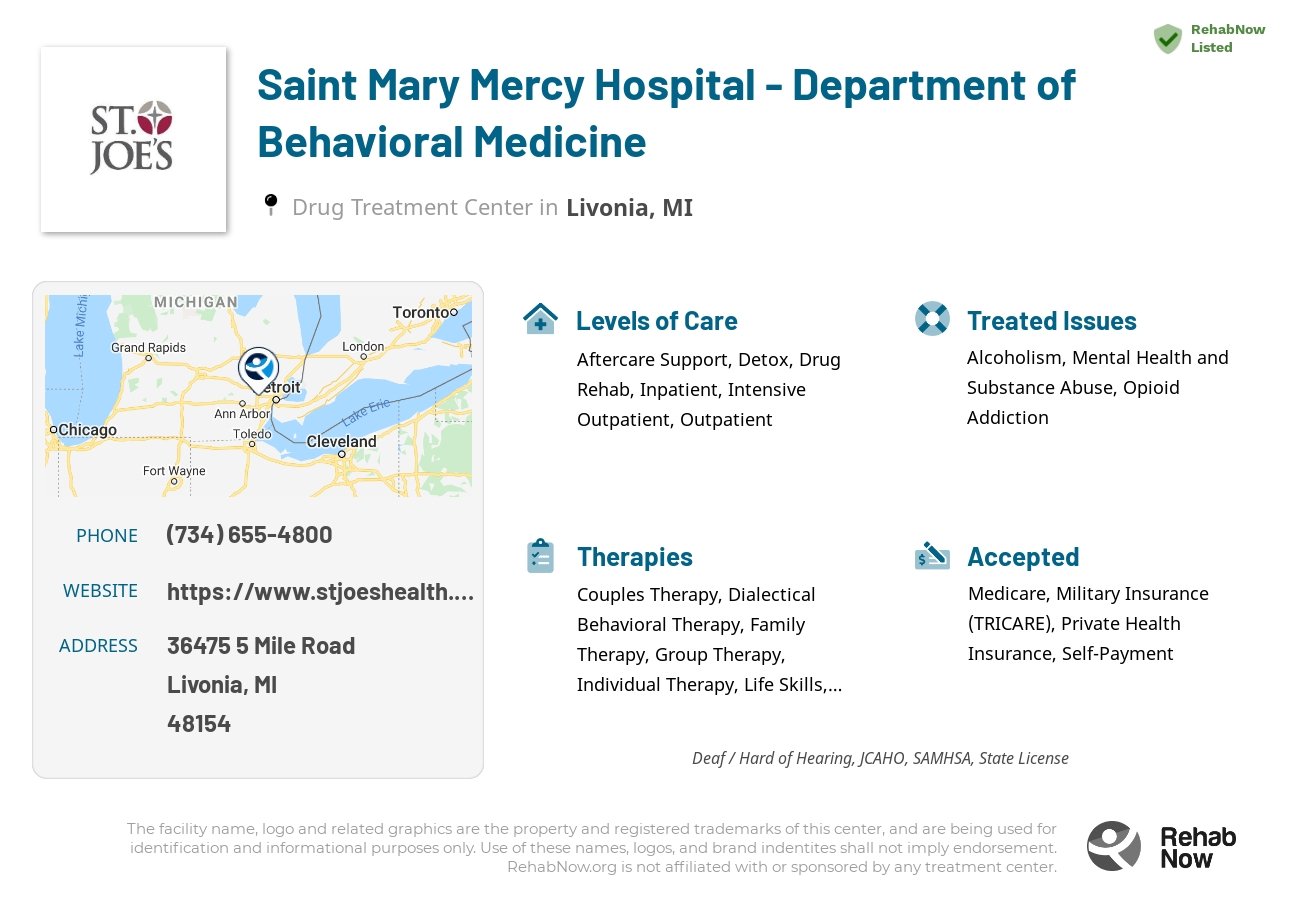Saint Mary Mercy Hospital - Department of Behavioral Medicine
Drug Rehab Center in Livonia, Michigan
The Saint Mary Mercy Hospital - Department of Behavioral Medicine in Livonia, MI is an accredited addiction treatment facility that provides various levels of care and services for individuals struggling with alcoholism, dual diagnosis, opioid addiction, and drug addiction, and accepts private health insurance.
About Saint Mary Mercy Hospital - Department of Behavioral Medicine in Michigan
Saint Mary Mercy Hospital – Department of Behavioral Medicine in Livonia, Michigan, stands out for its specialized focus on overcoming alcoholism, drug addiction, and mental health challenges, including opioid addiction. Located within the Saint Joseph Mercy Health System, this private rehab facility is distinguished by its comprehensive care and support throughout the recovery process.
Accredited by JCAHO and SAMHSA and holding a State License, Saint Mary Mercy Hospital ensures the highest quality of treatment and care. This facility is praised for its broad spectrum of services tailored to each patient’s journey towards recovery, accepting Private Health Insurance to broaden access to its programs.
- Saint Mary Mercy Hospital offers a holistic approach to addiction recovery, integrating mental health and substance abuse treatment.
- Patients benefit from a wide range of treatment options, including detoxification programs, inpatient care, and outpatient services.
- The facility’s strong affiliation with Saint Joseph Mercy Health System ensures a seamless and coordinated healthcare experience.
Specializing in treating alcoholism, opioid addiction, and drug addiction, Saint Mary Mercy Hospital employs various treatment methods and levels of care. Whether through intensive outpatient programs, inpatient care, or detoxification, patients receive personalized treatment aimed at achieving lasting sobriety and improved mental health.
Genders
Ages
Modality
Additional
Accreditations
State License
SAMHSA

JCAHO
Conditions and Issues Treated
Treatment for opioid addiction is best made with the help of medical professionals who are experienced in dealing with these types of drugs. This treatment can involve medications, exercise, behavioral therapy, and counseling sessions. It is important to note that the effectiveness of treatments for opioid addiction vary, so it is vital to research which treatment options are suitable for each individual.
Many people who struggle with opioid addiction need to attend specific programs like methadone , Suboxone or Vivitrol clinics.
These types of programs will provide the patient with legal, prescription medications that can help them overcome their cravings for illegal opioids like heroin or fentanyl . If the patient has a chronic condition like Hepatitis C, they must undergo treatment before they can begin taking these medications.
Levels of Care Offered
This center offers a variety of custom treatment tailored to individual recovery. Currently available are Aftercare Support, Detox, Drug Rehab, Inpatient, Intensive Outpatient, Outpatient, with additional therapies available as listed below.
Detox is the stage of recovery where the drugs or alcohol are entirely removed from your body. There are two different ways to detox, with medications and without. For many drugs and alcohol, the acute phase of detox can be completed in a number of days.
Inpatient recovery offers individual therapy, groups, and family therapy. The length of inpatient addiction treatment depends on the addict and their addiction. Inpatient rehab is a costly drug treatment, costing anywhere from $30k- to $60k. However, insurance often offers help in covering these costs.
An intensive outpatient treatment program, or IOP, is set up for those struggling with an addiction to begin the recovery process. However, the patient will not live at the facility during treatment.
IOP involves patients coming in and out of a medical office building regularly to receive therapy and other services while continuing their life outside of these visits.
IOP is a step up from drug detoxification or alcohol detox. However, it’s still considered a phase of recovery rather than the ultimate goal. There are many rehabs and treatment facilities available to patients in need of IOP.
Outpatient treatment can be considered the lowest intensity level of addiction treatment in Livonia, MI. It is ideal for early phase addiction or lower intensity addictions. Saint Mary Mercy Hospital - Department of Behavioral Medicine peer group support, 12-step programs, and individual counseling are likely to be involved.
Aftercare support is vital to those who have completed a drug or alcohol treatment program. This support comes in individual and family counseling, treatment of psychiatric and other medical conditions, and medications to reduce cravings. It helps recovering addicts adjust to normal day-to-day activities and can last for a year or longer.
The majority of drug and alcohol addicts who receive aftercare treatment do not relapse. It is estimated that without aftercare, the relapse rate will be between 70 to 90 percent for most people. Aftercare is the final stage in addiction recovery, but it will also help maintain sobriety if relapse does occur.
Therapies & Programs
Individual therapy is ideal for addicts who want to focus on themselves. It can also be helpful for those whose withdrawal symptoms are exacerbated by the presence of other people.
Benefits of individual therapy are:
- Access to a personalized treatment plan that focuses on the individual needs of the addict
- More privacy during treatment sessions
- Better personal development through introspection
- Increased self-awareness regarding addictive tendencies in order to avoid relapse
- Greater potential for a long-term recovery plan
- Receiving professional advice and detox assistance from medical staff
Couples therapy is a treatment method used to help couples in which at least one member of the couple has a drug addiction. Couples therapy can be used whether the addicted partner is using drugs or in recovery. An additional benefit of couples therapy is that it can help make other types of treatment, such as 12-step programs, more effective.
Family therapy can help you and your family deal with old issues that may trigger substance abuse. The idea behind family therapy for drug addiction is that you are never fully healed from substance abuse until you’ve healed your relationship with your family, too. To get sober, you need to find a different way to cope with the pain in your life.
This is when a group of people in various stages of recovery meet up and discuss their experiences, triggers, successes, failures, and even alternative therapies! Unlike support groups where everyone already knows each other, group therapy is conducted along side outpatient or inpatient treatment at Saint Mary Mercy Hospital - Department of Behavioral Medicine.
Trauma therapy is a clinical process that helps individuals deal with mental stress often caused by traumatic events. The therapist helps the person identify, understand and work through the problem. This is done with the help of talking about it in group or one-on-one counseling sessions.
Therapists use relaxation, role-playing, art, and music to help the person open up about what is bothering them. Some examples include:
- Talking about the traumatic event and how it affected them.
- Helping those who have PTSD to deal with their nightmares and recurring memories.
- Working with individuals to resolve the issues triggering the stress, whether seeing someone who reminds them of what happened or feeling helpless.
The individual is also encouraged to help others that are struggling with similar problems. This often helps them feel empowered and gives them hope.
Trauma therapy is not for everyone; it is usually reserved for people who have recently experienced a traumatic event and struggle to get over it. It is generally done for children, teenage victims of sexual assault, and war veterans.
Dialectical Behavior Therapy (DBT) is used by drug treatment centers across the United States to help drug addicts become sober. DBT is a type of Cognitive Behavioral Therapy (CBT) that combines traditional behavioral treatments with elements from DBT, including dialectics, distress tolerance, and interlocking issues. Some of the negative behaviors associated with addiction, such as impulsivity and mood swings, are addressed in DBT, while others like craving and isolation are not. It is commonly used to treat Borderline Personality Disorder (BPD) along with substance abuse disorders.
The four DBT modules are mindfulness, interpersonal effectiveness, emotion regulation, and distress tolerance:
- Mindfulness helps recovering addicts learn to identify and experience their emotions while realizing that they are not permanent.
- Interpersonal Effectiveness includes assertiveness, asking for what you need, and saying no while improving communication skills.
- Distress Tolerance has recovering addicts learn how to tolerate distress at the moment and avoid resorting to substance abuse.
- Emotion Regulation is used to identify, express and change emotions.
CBT is a psychotherapy approach and method. [ws-nap-name] people to examine how their thoughts, including habitual harmful and inaccurate thinking, affect their actions. CBT is based on the idea that rigid, inflexible thinking leads to poor stress management, which leads to emotional distress.
Similarly, CBT helps people identify and change negative behaviors. It makes you question your perceptions and ask if they are realistic. CBT asks people to examine their behaviors and emotional responses and how they affect their lives. CBT aims to change people’s thinking and behavior to lead a more balanced and healthy life.
Moreover, CBT has been shown to reduce anxiety disorders, depression, and symptoms associated with harmful thoughts or actions.
Those struggling with addiction can benefit from learning certain life skills. It is not as simple as quitting drinking or taking drugs and thinking that the hard part is over. Being sober means living a whole new way of life. Many recovering addicts have found that they need to develop talents like time management, organization, communication skills, socialization skills, and self-esteem to make their life in sobriety work, Saint Mary Mercy Hospital - Department of Behavioral Medicine is here to help with that.
Payment Options Accepted
For specific insurance or payment methods please contact us.
Is your insurance accepted?
Ask an expert, call (888) 674-0062
Saint Joseph Mercy Associated Centers
Discover treatment facilities under the same provider.
- Saint Joseph Mercy Adolescent Partial Hospitalization in Ann Arbor, MI
- Saint Mary Mercy Hospital - Behavioral Health Unit in Livonia, MI
- Saint Joseph Mercy Health System - Behavioral Health in Ann Arbor, MI
- Saint Mary Mercy Hospital Dept of Behavioral Medicine in Livonia, MI
- Saint Joseph Mercy Hospital in Ann Arbor, MI
Learn More About Saint Joseph Mercy Centers
Additional Details
Specifics, location, and helpful extra information.
Livonia, Michigan 48154 Phone Number(734) 655-4800 Meta DetailsUpdated April 15, 2024
Staff Verified
Saint Mary Mercy Hospital - Department of Behavioral Medicine Patient Reviews
There are no reviews yet. Be the first one to write one.
Livonia, Michigan Addiction Information
Michigan has the second-highest rate of drug and alcohol abuse in the nation. Heroin is linked to more than 50% of the state's hepatitis C cases. Marijuana is the drug most often associated with crimes in Michigan, followed by methamphetamines. Opioids alone are responsible for almost 20% of all drug overdose deaths in Michigan.
Compared to other cities in Michigan, the drug addiction issue in Livonia is modest. According to recent statistics, more than 10% of the population in Livonia, MI, is addicted to drugs or alcohol. This has a ripple effect on families, workplaces, and the community. There are 1652 local and nearby rehab centers in Livonia, MI, that can help those struggling with addiction get sober.
Treatment in Nearby Cities
- Manistique, MI (283.9 mi.)
- Redford, MI (5.5 mi.)
- Cheboygan, MI (231.2 mi.)
- Menominee, MI (281.8 mi.)
- Reed City, MI (147.6 mi.)
Centers near Saint Mary Mercy Hospital - Department of Behavioral Medicine
The facility name, logo and brand are the property and registered trademarks of Saint Mary Mercy Hospital - Department of Behavioral Medicine, and are being used for identification and informational purposes only. Use of these names, logos and brands shall not imply endorsement. RehabNow.org is not affiliated with or sponsored by Saint Mary Mercy Hospital - Department of Behavioral Medicine.












